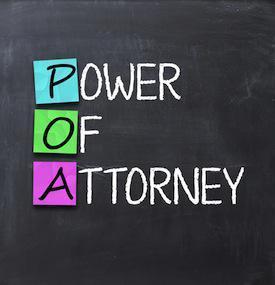Power of Attorney for Property Basics in Illinois
 Utilizing the Power of Attorney to manage what happens to your property is an important part of will, estate, and trust planning. Everyone has different needs and different circumstances when it comes to making arrangements for the handling of their possessions and accounts, but no matter how much or how little you own, it is helpful to know your belongings are protected and that your wishes are carried out.
Utilizing the Power of Attorney to manage what happens to your property is an important part of will, estate, and trust planning. Everyone has different needs and different circumstances when it comes to making arrangements for the handling of their possessions and accounts, but no matter how much or how little you own, it is helpful to know your belongings are protected and that your wishes are carried out.
The Purpose of Power of Attorney for Property in Illinois
The main purpose of the Power of Attorney in terms of property is to designate and grant a specific individual the authority to handle and make decisions regarding your various financial affairs. In the state of Illinois, this power allows that person (also referred to as an “agent”) to sell or dispose of your property, even without your consent. It also deems the agent right to make such decisions without giving you any advance notice. Ultimately, Power of Attorney is a tool that allows you to officially document and voice your wishes, how you do or do not want them carried out, and to whom you would like the power given to in the event that you cannot--or do not want to--make the final say on a financial matter.
Here are some examples of categories of powers you can grant the “agent” on the Power of Attorney form:
- Real estate matters;
- Financial institution transactions;
- Stock transactions;
- Bond transactions;
- Personal property transactions (tangible);
- Safe deposit box transactions;
- Insurance or annuity matters;
- Retirement plans;
- Social Security, employment, or military benefits;
- Tax matters;
- Business operations; and
- Borrowing, lending, or loan matters.
What the Powers Mean
The powers you grant to your agent allow them authority on those matters throughout the course of your lifetime. You maintain the right to revoke the Power of Attorney and the court has the right to withhold power from your agent if they determine that he or she is not acting properly on your behalf. The forms require the agent to acknowledge that they are expected to act in good faith, according to your best interests. A number of other statements are presented to the agent in order to ensure their good will and diligence, as well as to protect your best interests.
Navigating Power of Attorney procedures can be overwhelming for anyone not familiar with the process or laws involved. If you currently need guidance with managing a piece of property, contact a professional DuPage County estate planning attorney who can help ensure your best interest and your belongings are protected. Call A. Traub & Associates at 630-426-0196 (Lombard), 847-749-4182 (Arlington Heights), or 312-528-3290 (Chicago South Loop) for a consultation today.
Source:
https://www.illinois.gov/sites/gac/Forms/Documents/POA_Property_July2011.pdf















